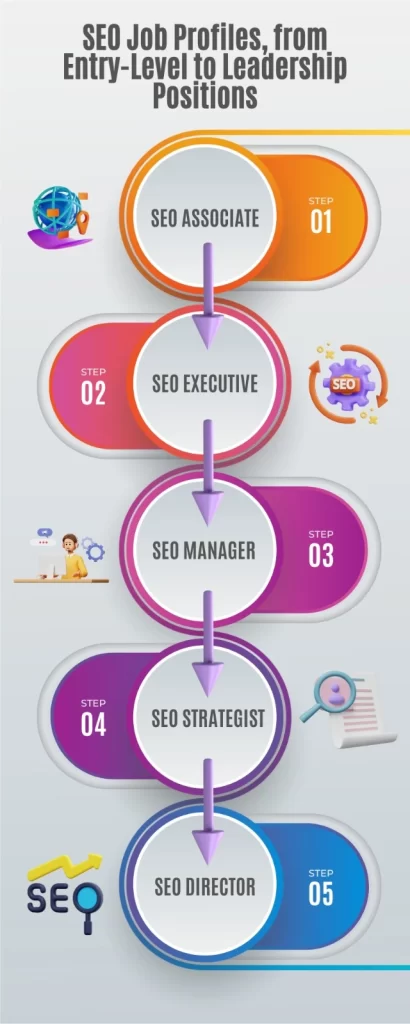The acronym SEO stands for “search engine optimisation.” Simply said, SEO is the act of making changes to your website that will make it more visible whenever someone searches on Google, Microsoft Bing, or another search engine. The pages you create are more likely to be seen and clicked on the more visible they are in search results. The end goal of optimisation for search engines is to assist in attracting website visits that will convert into visitors, clients, or an engaged audience.
Who is an SEO specialist?
A professional that specialises in optimising websites and online content to increase its exposure and ranking in search engine results pages (SERPs) is known as an SEO (Search Engine Optimisation) specialist. Their main objective is to boost a website’s organic (unpaid) traffic by making sure that it ranks higher for pertinent keywords and phrases. An SEO expert may be a member of an internal marketing team, work for a digital marketing company or SEO agency, or operate as a freelancer. To properly apply SEO tactics, they work with other stakeholders including site developers, content authors, and marketing managers.
According on experience, abilities, location, firm size, and industry, an SEO (Search Engine Optimisation) specialist’s pay in India might vary. Due to differences in the cost of living, salaries might also vary between cities. Please be aware that the numbers are only estimates and may change.
In India, an SEO professional can expect to earn between INR 250,000 and INR 900,000 annually. Salary ranges for junior or entry-level SEO professionals can be lower, whilst those with more experience and specialised knowledge can command greater compensation in the top range.
SEO Job Profiles, from Entry-Level to Leadership Positions

WHAT ARE THE TASKS OF AN SEO ANALYST?
- Finding pertinent terms and phrases that potential buyers are likely to type into search engines is known as keyword research.
- In order to increase keyword relevance and overall website performance, on-page optimisation involves optimising the content, meta tags, headers, and internal linking structure of websites.
- Off-Page Optimisation: Increasing the authority and reputation of the website by constructing high-quality backlinks using a variety of tactics, including outreach, content marketing, guest blogging, and social media engagement.
- Technical SEO: Examining and improving a website’s technical features, such as site speed, mobile friendliness, crawlability, and indexability, to make sure search engines can quickly access and comprehend the content of the website.
- Creating high-quality, pertinent, and engaging content that is in line with user intent and promotes organic traffic requires the development and implementation of a content strategy.
- Monitoring performance with a variety of tools and analytics platforms
WHAT FACTORS IMPACT THE SALARY OF AN SEO MANAGER?
- Experience and competence: An SEO manager’s remuneration is significantly influenced by the amount of experience and competence they have. Higher compensation is probably expected from those with numerous years of expertise and a track record of effective SEO efforts.
- Skills and Specialisations: Due to the rising demand for their specialised knowledge, SEO managers who have developed specialised skills or expertise in certain fields, such as technical SEO, content strategy, local SEO, e-commerce optimisation, or mobile SEO, may have a better income potential.
- Industry and Company Size: The SEO manager’s pay may vary depending on the industry in which they work. Higher compensation may be available in more competitive industries or those that largely rely on digital marketing. Moreover, bigger businesses or organisations with more SEO budgets may provide with higher salaries.
- Geographic Location: Depending on the SEO manager’s location, salaries might vary widely. Salary tends to be higher in areas or cities with higher costs of living and more demand for SEO specialists. For instance, SEO managers in large cities or IT centres may make more money than those in smaller cities or rural locations.
- Schooling and Certifications: Having appropriate degrees or certifications in digital marketing, SEO, or similar industries can significantly influence pay discussions, even though formal schooling isn’t necessarily a necessary prerequisite for SEO roles. Advanced certificates from credible organisations, such as those in Google Analytics or HubSpot, can show knowledge and increase your earning potential.
- Team Size and Job Responsibilities: An SEO manager’s pay may be affected by the range of their duties. People who manage bigger teams, are in charge of more projects, or handle strategic decision-making are probably paid more.
- Performance and Results: An SEO manager’s pay may be affected by how well they perform and meet their key performance indicators (KPIs). They may become more valuable and qualify for more pay by showcasing a track record of increasing organic traffic, enhancing search ranks, and favourably affecting business metrics.
- Market Demand and Competition: Salary ranges can be affected by the demand for SEO managers and the amount of competition on the job market. Employers may pay more if there is a strong demand for qualified SEO experts and a limited supply.
So, How Can One Get More SEO Projects?
Create a Professional Website and Optimise It for Relevant Keywords to Demonstrate Your Expertise: Create a Strong Online Presence to Demonstrate Your Expertise. Produce worthwhile material, such as blog entries or case studies, to showcase your expertise and draw in new customers. To make your website more visible in search engine results, optimise the on-page SEO.
Attend industry events, conferences, and meetings to network and build relationships with future clients, colleagues, and influencers. Participate in online forums, groups, and social media sites to meet people who could need SEO services. A solid professional network and the development of strong relationships might result in recommendations and new project prospects.
Create a quality website and optimise it for important keywords to establish a strong online presence that demonstrates your competence. Provide Free Resources and Advice By providing free tools like SEO audits, keyword research, or SEO plan consults, you may add value upfront. This raises the likelihood that potential clients will choose you for their SEO work by demonstrating your knowledge and fostering trust.
Utilize content marketing by producing excellent SEO and digital marketing-related articles for your blog or by guest blogging on websites serving the sector. You may draw a following and establish yourself as an authority in the industry by disseminating insightful information and practical advice. Inbound leads may be produced via content marketing, which also improves your chances of landing SEO assignments.
Offer Case Studies and Testimonials: Include customer testimonials on your website. List the successful SEO initiatives you’ve worked on, together with the difficulties you encountered and the outcomes you got. Case studies and success stories may increase your reputation and draw in prospective customers who recognise the value you can add to their initiatives.
Work along with Other Professionals: Form alliances with businesses that offer similar services, including web designers, developers, or digital marketing firms. By working together, you may provide clients with comprehensive solutions and make use of their networks to find new project possibilities.
Participate in online communities and social media: Take part in pertinent conversations on social media sites like Facebook groups, Twitter, or LinkedIn. Respond to inquiries, share insightful information, and interact with prospective customers and business professionals. By actively taking part in communities online and attracting potential projects
Your income depends solely upon how good you are at delivering high-quality work, maintaining relationships and staying dynamic to the updates.
